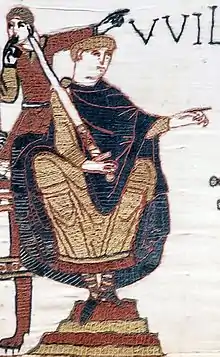William
William is a masculine given name of Germanic origin.[2] It became very popular in the English language after the Norman conquest of England in 1066,[3] and remained so throughout the Middle Ages and into the modern era. It is sometimes abbreviated "Wm." Shortened familiar versions in English include Will, Wills, Willy, Willie, Liam, Bill, and Billy. A common Irish form is Liam. Scottish diminutives include Wull, Willie or Wullie (as in Oor Wullie or the play Douglas). Female forms are Willa, Willemina, Wilma and Wilhelmina.
 William the Conqueror The name William became very popular in the English language after the Norman conquest of England in 1066 by William the Conqueror. | |
| Pronunciation | /ˈwɪljəm/[1] |
|---|---|
| Gender | Male |
| Origin | |
| Word/name | Germanic languages |
| Meaning | "Vehement protector" |
| Region of origin | Northern Europe |
| Other names | |
| Nickname(s) | Will, Wills, Willy, Willie, Liam, Bill and Billy |
| Related names | Wilhelm, Guillaume, Willian, Guillermo, Guglielmo, Guilherme, Gwilym |
| Popularity | see popular names |
Etymology
William is related to the German given name Wilhelm. Both ultimately descend from Proto-Germanic *Wiljahelmaz, with a direct cognate also in the Old Norse name Vilhjalmr and a West Germanic borrowing into Medieval Latin Willelmus. The Proto-Germanic name is a compound of *wiljô "will, wish, desire" and *helmaz "helm, helmet".[2]
By regular sound change, Proto-Germanic *Wiljahelmaz should have also descended into English as *Wilhelm, but this latter form is unattested in written English of any period; the Anglo-Saxon Chronicle refers to William the Conqueror as Willelm, a back-formation from the Medieval Latin variant.[4] The form William is a back-borrowing from Old Norman Williame, a specifically northern Norman reflex of Medieval Latin Willelmus (compare the Central French cognate Guillaume). The development of the name's northern Norman form can be traced in the different versions of the name appearing in Wace's Roman de Rou.[5]
The first well-known bearer of the name was Charlemagne's cousin William of Gellone (755–812). This William is immortalized in the Chanson de Guillaume, and the esteem in which he was held may account for the name's subsequent popularity among European nobility.
English history
The English "William" is taken from the Anglo-Norman language and was transmitted to England after the Norman conquest in the 11th century, and soon became the most popular name in England, along with other Norman names such as Robert (the English cognate was Hrēodbeorht, which by regular sound changes would have developed into something along the lines of "Reedbart"[6][7]), Richard, Roger (the English cognate was Hroðgar[8]), Henry (all of Germanic origin and may have been transmitted through the Normans' use of Old French).
The name Wilkin/Wilkins is also of medieval origin, taken from the shortened version of William (Will) with the suffix "kin" added.[9]
Variants
- Wilem, Awilemam (Koromfe)
- Weelum (Scots)
- Willum (Scots)
- Viliamu (Samoan)
- Viliami (Tongan)
- Whiriyamu (Karanga)
- Whiliyamu (Ndebele)
- Wilhelm (German, Polish, Swedish)
- Willem, Wilhelmus (Dutch, Frisian, Low German)
- Willem, Wilhelm (Afrikaans)
- Wiremu (Maori)
- Willelm (Old English)
- Williama (Hawaiian)
- Wëllem (Luxembourgish)
- Walaam (Persian)
- Wiliyom, Wiliyem (Bengali)
- Vĩnh Liêm, Vĩnh Lâm (Vietnamese)
- Billem (Toba Batak)
- Cuglierme, Gugliemo (Neapolitan)
- Golem, Gulielm, Ylli, Ylmer (Albanian)
- Gilen, Guilen (Basque)
- Gulielmus, Vilhelmus, Willelmus, Gullelmus, Gullielmus, Villelmus (Latin)
- Guglielmo (Italian)
- Guillaume (French)
- Guildhelm (Old Dutch)
- Guilhem (Occitan)
- Guillem, Guim (Catalan)
- Guillén (Aragonese)
- Guillermo (Spanish)
- Guilherme (Portuguese)
- Guillerme (Galician)
- Gwilym (Welsh)
- Gwilherm (Breton)
- Gugghiermu (Sicilian)
- Gllâome (Modern Norman)
- Uilliam (Irish)
- Liam (Irish)
- Illiam (Manx Gaelic)
- Uilleam (Scottish Gaelic)
- وِلْيَم – William (Arabic)
- Уилям – Uiliam (Bulgarian)
- װֶעלװֶעל – /ˈvelvel/ (Yiddish)
- Villem, Villu (Estonian)
- Вилям – Vilyam (Russian)
- Вільгельм, Вільям – Vil'hel'm, Vil'yam (Ukrainian)
- Уільям, Вільям – Uiĺjam, Viĺjam (Belarusian)
- Vilhelm (Danish, Norwegian, Romanian, Swedish)
- Vilhelmo (Esperanto)
- Vilhelms (Latvian)
- Viliam (Slovak)
- Viljem (Slovene)
- ויליאם – /ˈviljam/ (older propronunciation), /ˈwiljam/ (contemporary) (Hebrew)
- Vilim (Croatian)
- Вилим (Serbian)
- Vilém (Czech)
- Vilmos (Hungarian)
- Viljams, Vilhelms, Vilis (Latvian)
- Vilius, Viliumas, Vilhelmas (Lithuanian)
- Viljami, Ville, Vilho, Viljo (Finnish)
- Vilhjálmur (Icelandic)
- Vilhjálmur, Viljormur (Faroese)[10]
- Vilhjalmr (Old Norse)
- Vilko (Croatian)
- Vilyam, Vilyım (Turkish)
- Vėljams (Samogitian)
- Γουλιέλμος (Wouliélmos) (Greek)
- ܘܠܝܡ (Wil-yam) (Assyrian)
- Գուլիելմոս (Goulielmós) (Armenian)[11]
People named William
See also
- All pages with titles beginning with William
- Williams (surname)
- Bill (disambiguation)
- Billy (disambiguation)
- King William (disambiguation)
- Prince William (disambiguation)
- Saint William (disambiguation)
- Wilhelm (disambiguation)
References
- "william – Definition, pictures, pronunciation and usage notes | Oxford Advanced Learner's Dictionary at". Oxfordlearnersdictionaries.com. Retrieved 2022-05-06.
- Hanks, Hardcastle and Hodges, Oxford Dictionary of First Names, Oxford University Press, 2nd edition, ISBN 978-0-19-861060-1, p. 276.
- All Things William, "Meaning & Origin of the Name"
- Peter S. Baker. "William the Conqueror". oldenglishaerobics.net.
- René Lepelley, Guillaume le duc, Guillaume le rois: extraits du Roman de Rou de Wace, Centre de Publications de l'Université de Caen, 1987, pp. 16–17.
- this coming from a Middle English pronunciation of IPA: /rɛːdbɛ:r(x)t/→/rɛːdbɛɾt/→/ɾɛːdbaɾt/→/re:dbäɾt/, and finally, via the great vowel shift, /riːdbɑːrt/
- "Edgar's Name Pages, Robert". Edgar's Name Pages. Archived from the original on 2004-06-28.
- Mike Campbell. "Behind the Name: Meaning, Origin and History of the Name Roger". Behind the Name.
- An Etymological Dictionary of Family and Christian Names With an Essay on their Derivation and Import; Arthur, William, M.A.; New York, NY: Sheldon, Blake, Bleeker & CO., 1857; pg. 266.
- List of Faroese male names
- M. Petrossian (ed.). New Dictionary Armenian-English. Librairie de Beyrouth.